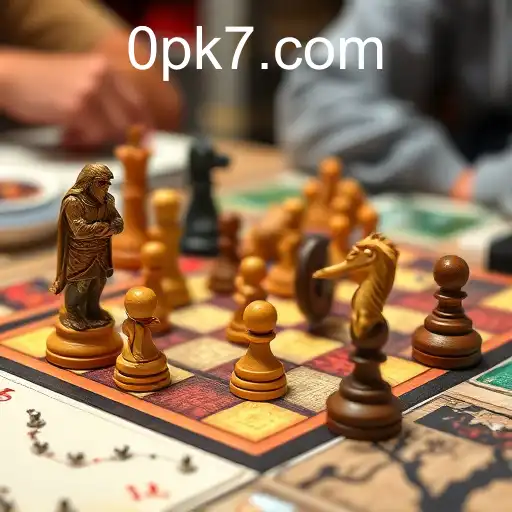
Discover the Thrilling World of LuckyMacaw: A Dive into the Gaming Experience
Explore the captivating universe of LuckyMacaw, a modern gaming sensation, featuring its enthralling gameplay, introduction, and rules to master this adventure.
Home » Tabletop Game
Tabletop games have been an integral part of human entertainment for centuries. From ancient board games to modern-day strategy ones, they offer a unique experience of leisure and strategy combined. Among these, the term 'pk7' emerges as an intriguing element for enthusiasts and newcomers alike. In this detailed discussion, we’ll delve into the aspects of tabletop gaming while focusing on the phenomenon of pk7.
The journey of tabletop games from their inception to their current form is a testament to human creativity and sociability. Initially, games like Chess and Backgammon, which date back thousands of years, offered entertainment and intellectual challenges. The tactile nature of these games allowed players to engage with one another directly, a characteristic that persists in the communal spirit of modern tabletop gaming.
With the passage of time, games evolved to include a plethora of genres and types, from board games and role-playing games (RPGs) to miniature wargaming and card games. Each category introduced new rules and strategies, adding layers of complexity and enjoyment. But how do pk7 fit into this diverse tapestry?
While not a mainstream component of tabletop gaming, pk7 can be considered part of a niche or subculture within the broader gaming community. Its relevance might hinge on particular game mechanics, rules, or modes of play that are unique to specific game products or communities. Investigating pk7's role offers a glimpse into the specialized and often personalized nature of table game adaptations.
As tabletop games continue to gain popularity, unique innovations and special terms like pk7 encapsulate the personalized experiences that players seek. They symbolize a broader trend where gamers invent and share custom rules, ensuring games feel unique and constantly evolving.
Like many aspects of tabletop gaming, the term pk7 could represent specific mechanics or strategies. Perhaps it's a variant of an existing game that introduces a new layer of challenge or variability, adding to the excitement and unpredictability of gameplay. These practices are foundational to the gaming community, which thrives on diversity, creativity, and experimentation.
Moreover, pk7 might involve distinctive styles of play that impact how players interact with the game environment. Exploring this further within the gaming ecosystem could reveal the essence of pk7's strategic elements, whether they pertain to risk management, probability, resource allocation, or player interaction dynamics.
At the heart of tabletop gaming lies a vibrant community characterized by camaraderie, creativity, and inclusivity. Enthusiasts gather at local game shops, conventions, and online platforms to engage in shared storytelling, strategic battles, or cooperative quests. Within this ecosystem, terms like pk7 symbolize the evolving language and tools employed by passionate players to express distinct gameplay narratives.
These communities often self-regulate, setting guidelines on custom rules like pk7 that might imbue their games. This encourages members to embrace unique playstyles, variables, or scenario-based storytelling, which ensure that games remain fresh and engaging despite repeated playthroughs.
As we look toward the future, the realm of tabletop games is expected to thrive with creativity and technological integration. In this context, pk7 could represent innovations that blend traditional gameplay with digital advancements, perhaps through augmented reality or digital expansions that complement physical components.
The inclusion of pk7-type mechanics is seen as a developmental stream rather than a diversion from traditional formats. It ensures that tabletop gaming continues to appeal to both older players who cherish classic formats and younger audiences who crave modern twists.
While pk7 may start as an obscure or minor element, its potential to evolve into a mainstream part of specific genres could create a wave of new challenges and adaptations. Gamers driven by curiosity and a willingness to experiment will undoubtedly pick up on such trends, driving further innovation.
The realm of tabletop games is vast, filled with opportunities to encounter various iterations and forms of play like pk7. These elements highlight the adaptability and creativity inherent in gaming culture. Whether redefining traditional games or embracing entirely new concepts, tabletop gaming continues to be a dynamic and ever-evolving platform for personal expression and community building.
In summary, pk7 represents more than just a facet of niche gaming—it is a testament to the endless potential for evolution, innovation, and personalized engagement within the world of tabletop games.


Explore hundreds of slot games, live casino tables, and unique fishing games. We regularly update our collection with new releases, so there’s always something fresh to try.
Enjoy generous welcome bonuses, free spins, and daily promotions. Whether you’re a new player or a returning member, we offers plenty of ways to boost your winnings.
We’re here to help whenever you need it. Our customer support team is available around the clock to assist with any queries or issues.
Take the fun with you! Our platform is fully optimized for mobile devices, allowing you to play on your smartphone or tablet without compromising quality
Step into the exhilarating world of card games with pk7! From timeless classics like Pok Deng and Tongits to the fast-paced excitement of Color Game and Hoo Hey How, our diverse selection captivates every player.
In collaboration with top providers like TP, JILI, KM, FTG, and RICH88, we deliver a stunning array of games that promise nonstop entertainment. Furthermore, each game offers more than just strategy and skill—expect heart-racing action and mind-bending challenges that will keep you engaged at every turn!
pk7 is excited to offer an exclusive PHP 66 free bonus to kickstart your card gaming journey! Explore our vast library of card games, featuring both beloved classics and exciting new releases that promise endless entertainment.
Use this special bonus to enhance your gaming experience and discover everything pk7 has to offer. Whether you’re a seasoned player or just starting, our platform caters to all skill levels. Moreover, enjoy expert tips, strategic insights, and thrilling opportunities to win big!

Explore the captivating universe of LuckyMacaw, a modern gaming sensation, featuring its enthralling gameplay, introduction, and rules to master this adventure.

Dive into the captivating universe of DragonHeart, a game that combines fantasy and strategy against the backdrop of current global events.

Explore NekoFortune, a captivating game blending luck and strategy in a whimsical feline-themed universe. Discover its engaging gameplay, rules, and the intriguing role of the mysterious 'pk7' feature.

Discover the fascinating world of WAROFTHEUNIVERSE, a thrilling strategic game taking the gaming universe by storm, blending real-time strategy with innovative gameplay rules.

Dive into the thrilling universe of JungleTreasure where adventure, strategy, and mystery await. Discover the game's features, rules, and what makes it a must-play.

Dive into the exhilarating world of WildRacer with our comprehensive guide to the game features, gameplay, and rules. Discover the unique elements that make it a standout in the racing genre.

pk7 – The Ultimate Destination for Gaming Enthusiasts Worldwide
Pk7 is your ultimate destination for thrilling online games ranging from action-packed challenges to strategic puzzles. Explore new levels, compete with friends, and enjoy seamless gameplay on an engaging and user-friendly platform designed for both casual and hardcore gamers. Experience unparalleled entertainment with an extensive library of games that cater to every interest and skill level.
Ph' Best Casino
Safe Payment

